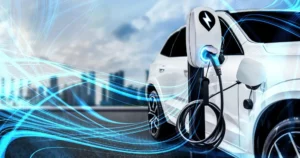The Future of Electric Vehicles: What’s Next for the Automotive Industry

Electric vehicles (EVs) have rapidly evolved from a niche market to a mainstream force reshaping the automotive industry. With increasing environmental concerns, advancements in technology, and the growing demand for sustainable transportation solutions, EVs are positioned to play a significant role in the future of the automotive sector. As governments and automakers push toward achieving carbon-neutral goals, the future of electric vehicles looks promising, with innovations set to transform not only how cars are powered but also how they are designed, manufactured, and integrated into daily life.
1. Advancements in EV Battery Technology
At the heart of the electric vehicle revolution is battery technology. The future of EVs largely depends on the development of batteries that are not only more efficient but also cheaper and longer-lasting. Lithium-ion batteries have dominated the EV market so far, but manufacturers are actively exploring alternatives. Solid-state batteries, for example, promise higher energy densities, faster charging times, and improved safety compared to current lithium-ion batteries. These advancements would solve some of the common challenges faced by electric vehicles, such as limited driving range and long charging times.
Moreover, as battery production scales up, costs are expected to continue to decrease. This trend will make EVs more accessible to a wider audience, accelerating their adoption. With governments around the world offering subsidies and incentives for EV purchases, the future looks brighter than ever for electric vehicles.
2. Expanding EV Infrastructure
One of the biggest obstacles to widespread EV adoption is the availability of charging infrastructure. While electric vehicle charging stations have been growing in number, they are still not as ubiquitous as gas stations. The future of electric vehicles hinges on expanding the charging network, particularly in rural areas and underserved regions.
Innovative solutions like ultra-fast charging stations are being developed, which can charge an EV to 80% in just 15 to 20 minutes. As the infrastructure improves, drivers will have more confidence in making long-distance trips, ultimately leading to a broader adoption of electric vehicles. In addition, home charging solutions are also becoming more affordable, allowing owners to charge their vehicles overnight, making EVs even more convenient.
3. Integration of Artificial Intelligence and Autonomous Driving
The future of electric vehicles is also intertwined with the evolution of autonomous driving technology. Many electric vehicle manufacturers are investing heavily in artificial intelligence (AI) and machine learning to bring fully autonomous vehicles to market. EVs are an ideal platform for this innovation because they are inherently more connected and have simpler drivetrains compared to traditional internal combustion engine vehicles.
By integrating AI with EVs, manufacturers aim to create safer, more efficient driving experiences. Autonomous vehicles powered by AI can potentially reduce accidents caused by human error, optimize energy consumption, and enhance traffic management in urban areas. Additionally, electric vehicles’ reliance on advanced sensor systems, which already play a role in self-driving cars, allows for seamless integration with AI technology.
4. Sustainability and Green Manufacturing
Sustainability is a key driver of the electric vehicle industry, not only in terms of the vehicles themselves but also in how they are produced. Automakers are increasingly focused on reducing the carbon footprint of manufacturing processes. This includes using renewable energy to power factories, recycling battery materials, and sourcing sustainable materials for car production.
The future of electric vehicles will see more emphasis on circular economy practices, where manufacturers will aim to reuse, refurbish, and recycle components to minimize waste. Battery recycling is an area of particular interest, as it can prevent the environmental damage caused by mining raw materials while also reducing the cost of producing new batteries. As the EV market matures, sustainable production practices will become a standard across the industry.
5. Government Regulations and Incentives
Government policies will continue to shape the future of electric vehicles. In many countries, governments have set ambitious targets for phasing out the sale of new gas-powered vehicles and replacing them with electric vehicles. The European Union, for instance, aims to make all new cars sold in its member states carbon-neutral by 2035. Such regulations will undoubtedly accelerate the shift toward electric vehicles and prompt automakers to invest in EV development.
In addition to bans on internal combustion engine (ICE) vehicles, governments are introducing financial incentives such as tax credits, rebates, and subsidies to encourage consumers to buy electric vehicles. These incentives will help make EVs more affordable, particularly in the early stages of adoption when prices are still relatively high. These policies and initiatives will be pivotal in driving the transition to a more sustainable automotive future.
6. The Role of Traditional Automakers and New Entrants
Traditional automakers are increasingly recognizing the need to shift towards electric vehicles. Companies like Ford, General Motors, and Volkswagen have already committed billions of dollars to EV development and are launching electric models across various segments, from compact cars to trucks and SUVs. These established brands bring the advantage of large-scale manufacturing capabilities, extensive research, and a global distribution network, which will be key to scaling EV production.
Meanwhile, new entrants like Tesla have revolutionized the EV industry with their cutting-edge technology and direct-to-consumer sales models. The rise of new companies is pushing traditional automakers to innovate more rapidly, ensuring that competition in the electric vehicle market remains fierce.
Conclusion
The future of electric vehicles is undeniably bright. From breakthroughs in battery technology to the expansion of charging infrastructure and the integration of autonomous driving, the automotive industry is undergoing a profound transformation. As governments continue to push for cleaner transportation solutions, the electric vehicle sector will remain a central focus of innovation. With both traditional automakers and new players investing heavily in electric mobility, the shift toward a greener, more sustainable automotive industry is well underway. Electric vehicles are no longer a passing trend; they are the future of transportation.






